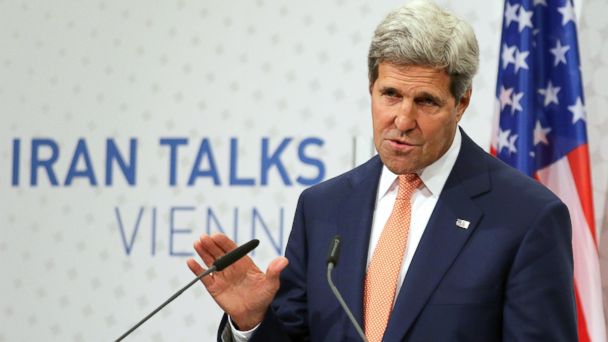Why John Kerry Was Out of the Loop With Egypt's Ceasefire Plan

U.S. Secretary of State John Kerry speaks to the media after closed-door nuclear talks on Iran in Vienna, July 15, 2014. (Ronald Zak/AP Photo)
Secretary of State John Kerry was all set to travel from nuclear negotiations in Austria to Egypt to help work out a ceasefire between Israel and Hamas, but before he could even get to the Vienna airport, Egypt beat him to the punch - or, more accurately, the truce.
A U.S. official said State Department staff members were already in Cairo in anticipation of Kerry's arrival there, but the trip was called off soon after the government of President Abdel Fattah al-Sisi announced it had drafted a ceasefire plan that called for an immediate end of hostilities on both sides.
"One of the reasons I'm going to Washington and not to Egypt," Kerry said in Vienna this morning, "is because there was this offer on the table."
"I am prepared to fly back to the region tomorrow if I have to, or the next day or the next, in order to pursue the prospects if this doesn't work," he added, just hours before Israel began shelling Gaza again, formally breaking the ceasefire.
READ: Israel: Hamas To Pay Price for Its 'No' To Truce READ: Israel Hammers Rocket Launchers. Tunnels in Fresh Gaza Barrage
The reality was that it was in Egypt's own interest to quickly announce a peace plan, albeit one that was promptly broken, even if it meant dismissing the Obama administration's repeated offers to help, experts said.
Egypt has been on bad terms with Hamas ever since al-Sisi took power and began vilifying the group as perpetrating attacks from within the country. Egypt would benefit if Israel used Hamas' violation of the ceasefire as justification for a larger-scale attack against Gaza, as Prime Minister Benjamin Netanyahu suggested he'd do this afternoon, said Council on Foreign Relations fellow Steven Cook.
"It's good politics for the Egyptians to allow a withering assault on Hamas," Cook said.
But while Egypt wouldn't mind delivering a larger blow to Hamas, it wants to still be seen as a champion for Palestinian civilians, noted Michele Dunne, an expert at the Carnegie Endowment's Middle East Program and a State Department veteran.
Egypt's announcement of a ceasefire plan that almost immediately failed gave Israel the green light for a harder strike without Egypt being seen as the villain, she said.
"The security interests of the Egyptian government lie with Israel here," she said. "But the political interests of Egypt are in standing with the Palestinians and being seen as caring about the people of Gaza in its role as a fellow Arab nation."
Plus, Dunne said, Egypt is used to being the main broker in peace negotiations between Israel and Hamas - a reputation that was damaged after former president Mohamed Morsi, a Muslim Brotherhood leader, was removed from office.
"Egypt wants to be seen as playing its traditional leadership role in the region, even if it actually can't do that," she said.
Egypt's own motivations aside, Hamas is also deeply divided between a political wing, which seemed at least open to the ceasefire proposal, and a military wing, which rejected it outright. That division makes it even harder for the United States to play a role in such preliminary negotiations, said Brian Katulis, a national security expert at the Center for American Progress, a left-leaning think tank.
"The Middle East is like Humpty Dumpty and we can't find the glue to put it back together again, in part because the different pieces are at odds with each other," Katulis said.
State Department spokesperson Jen Psaki said in an email that Kerry had been in constant touch with the Egyptians, Israelis and Palestinians at every point in the process leading up to Egypt's announcement of the ceasefire plan.
"He is prepared to get on a plane immediately when and if the time is ripe and the dynamic makes sense to play a role on the ground. But timing is everything in diplomacy and he made a strategic decision to give the Egyptian initiative the time and space to succeed and he's not making a trip until the time is ripe for that kind of intervention."
The question remains, however, why the administration had been so vocal with its offers to help if all parties seemed so far apart, and if Egypt had ulterior motives in announcing this ceasefire anyway.
Cook said it may be a result of Kerry's belief in his own ability as a diplomat - case in point, the great personal time and effort he spent in an ultimately failed bid to move the Middle East peace process along.
"You have to admire that in him," Cook said. "But at the same time if you look at this historically - if you look at any ceasefire anywhere - the parties have to want to have the ceasefire."
And at least at this point, Cook said, neither the Israelis nor the Palestinians are so willing to negotiate that they're ready to have the United States act as an outside mediator.
"We'll just have to wait and see until one side or the other decides they've made their point, or have been bloodied enough."